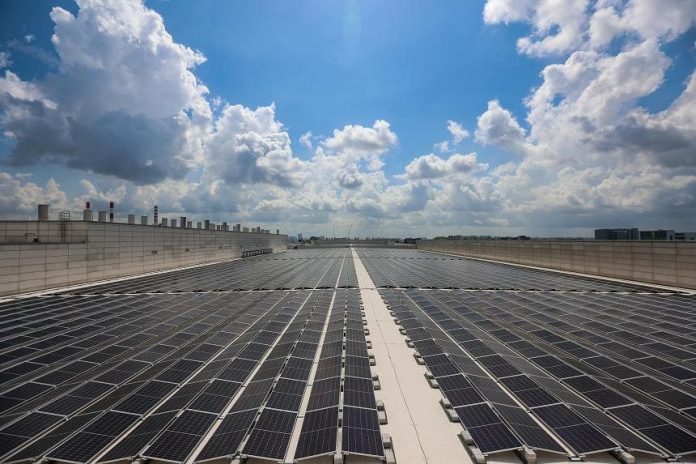Micron Technology, one of the world’s biggest memory chipmakers, is in the process of installing 36,000 solar panels on the rooftops of its fabrication plants and on its carport shelter tops in Singapore, and using the renewable power produced to lower its carbon footprint.
When all the panels are installed by 2024, the project will produce electricity that is able to power 6,000 homes, said Mr Chen Kok Sing, the US company’s vice-president and Singapore country manager.
The renewable power installation is being done in collaboration with Singapore’s Sembcorp Industries. Under the deal, the installation is conducted by Sembcorp on the space provided by Micron, which in return will enjoy concessional tariffs for the power produced for several years.
Mr Chen, speaking to reporters at Micron’s office in Woodlands, said the installation is a major addition to Singapore’s solar panel landscape.
Energy costs account for as much as 30 percent of a semiconductor foundry’s operating expenses. Singapore has a total of 16 such foundries that account for about 11 percent of the global semiconductor market.
Micron’s solar project in Singapore is part of its goal to achieve net-zero greenhouse gas emissions in its operations and its purchased energy by 2050 globally.
In fiscal year 2022, Micron achieved 100 percent renewable energy in Malaysia and signed its first major power agreements to complement the company’s goal to do the same for its existing United States operations by the end of 2025.
Mr Chen said the company also actively works with its suppliers to identify emission-reduction projects such as equipment upgrades, efficiency improvements and renewable energy purchases.
Micron’s Singapore facility – run on smart-controlled systems and predictive maintenance technologies – increased manufacturing output by about 270 percent between 2018 and 2021, while reducing resources used to produce every gigabyte by 45 percent.
In recognition of this accomplishment, the World Economic Forum in 2022 named Micron Singapore a “sustainability lighthouse” – the first front-end semiconductor fabrication in the world to receive this designation.
Manufacturing silicon wafers also typically requires the use of two million to five million gallons of uncontaminated or ultra-pure water per day.
Micron aims to conserve water by using recycled water and further recycling the used water in-house, Mr Chen said.
He lauded the Singapore Government for its support of Micron’s sustainability efforts.
“In many countries, you are on your own,” he said, citing how the company had to make such efforts with little or no support in other destinations.






